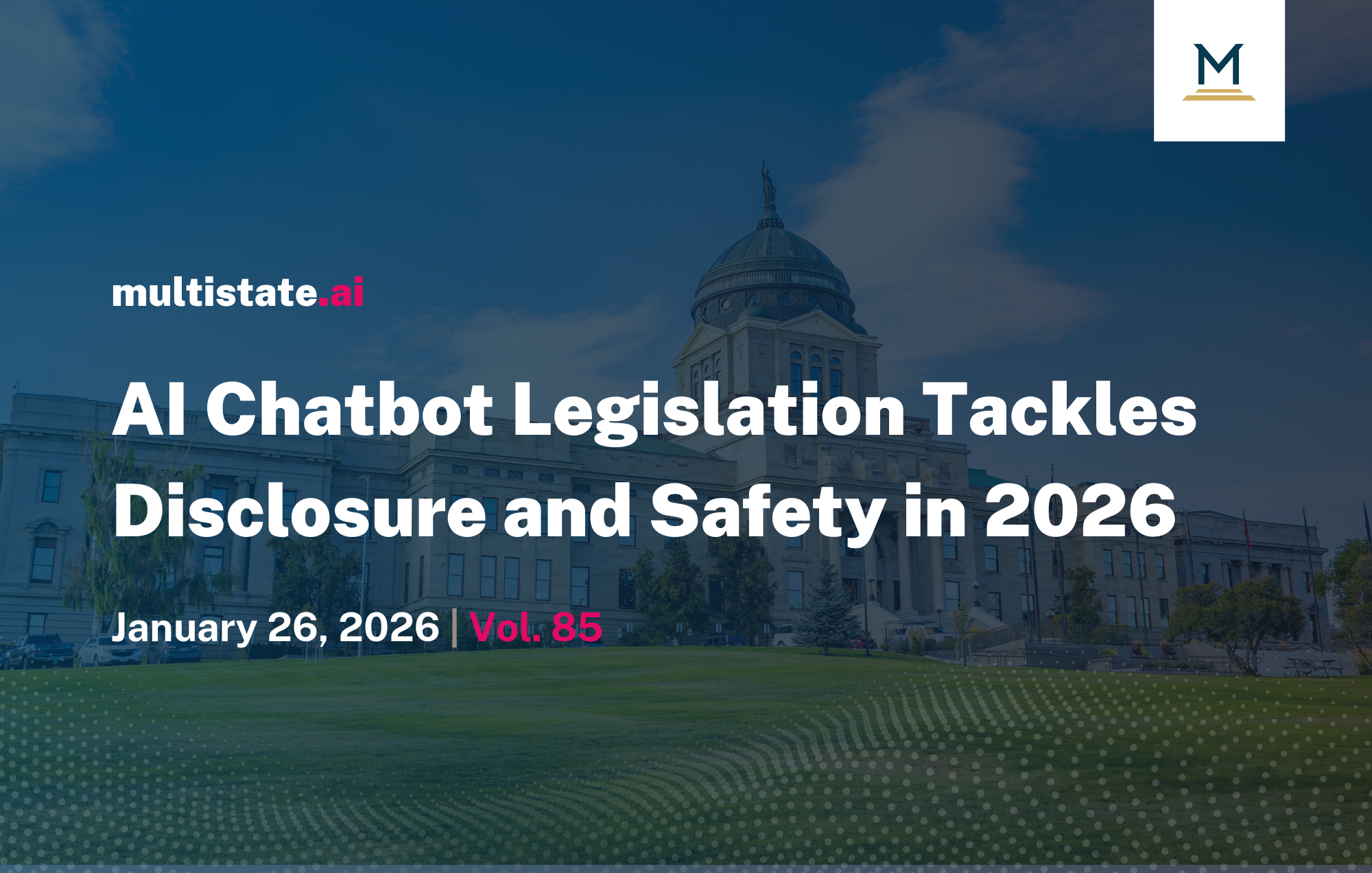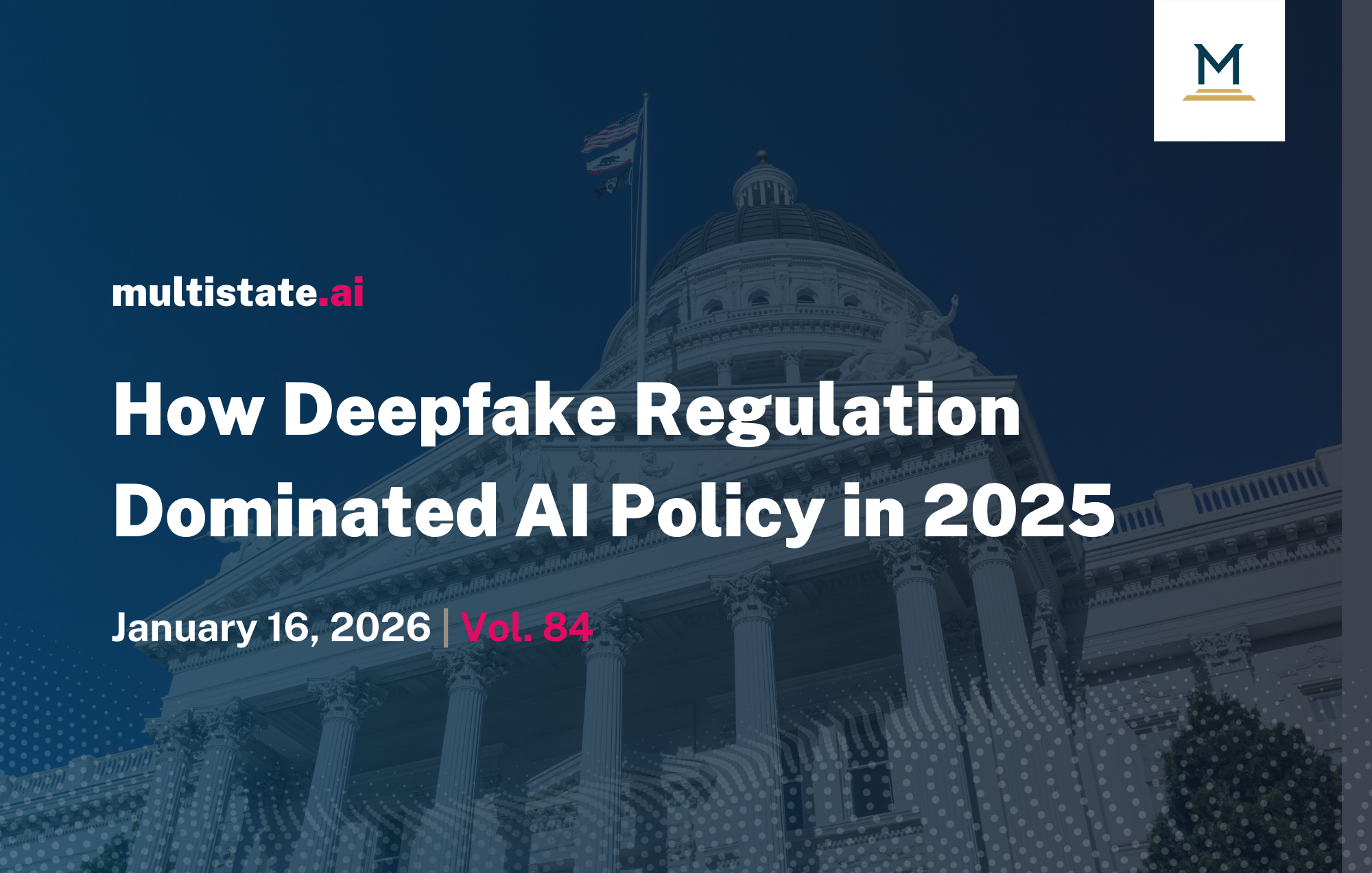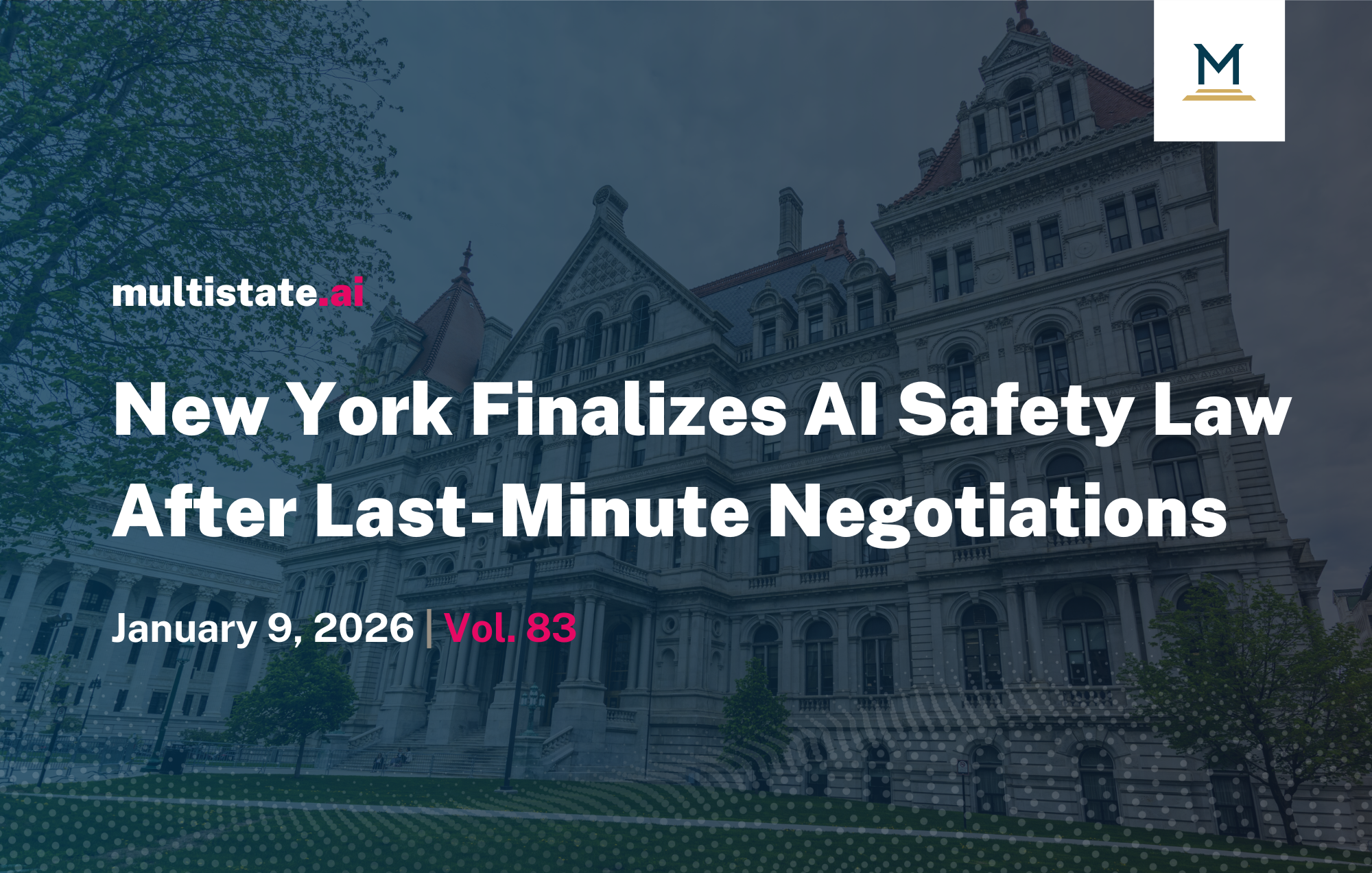Inside Florida's “AI Bill of Rights”
Florida lawmakers introduced comprehensive AI legislation (HB 1395/SB 482) following Gov. DeSantis' December proposal, with the Senate version already receiving committee approval. The bills regulate chatbots through disclosure requirements and parental consent for minors, expand consumer privacy protections beyond current $1 billion revenue thresholds, and protect digital likenesses from unauthorized commercial use, effective July 2026.
States Have AI Chatbots in Their Crosshairs
State lawmakers in 2026 are shifting from comprehensive AI bills toward targeted chatbot regulations, focusing on child safety, disclosure requirements, and professional services. California and New York enacted companion chatbot laws requiring safety protocols and user notifications. Illinois and Nevada prohibited AI from practicing mental health services independently. Fifteen states have introduced companion chatbot bills, with Maine requiring disclosure for commerce interactions.
New York Finalizes AI Safety Law After Last-Minute Negotiations (RAISE Act)
Governor Hochul signed New York's RAISE Act in December 2025 after negotiating significant changes with lawmakers, aligning the legislation with California's AI safety law. The final version requires frontier AI developers to submit safety reports to the Department of Financial Services, with enhanced requirements for companies exceeding $500 million in revenue. Civil penalties were reduced from $10-30 million to $1-3 million, effective 2027.
How States Are Approaching AI Developer Definitions in AI Legislation
States are defining AI developers differently, creating regulatory uncertainty for companies. Colorado includes entities that "intentionally and substantially" modify systems, while California targets only "frontier models" using computing thresholds from Biden's executive order. New York's RAISE Act adds $100 million cost requirements. These definitional choices determine whether laws apply to major tech companies or broader software developers.
AI Policy Defined: Deployers & High-Risk Systems
This week, we’ll begin a multi-part series examining how enacted laws define important terms in AI policy. This first article will focus on the “deployers” and “integrators” of artificial intelligence models. Next week, we will focus on definitions relating to model-developer regulation.
California's AI Chatbot Battle Moves to the Ballot Box
In California, like in 19 other states, citizens can circumvent the governor and the legislature altogether and enact laws directly through a ballot measure. And a week after Gov. Newsom vetoed the more restrictive AI chatbot bill, supporters of that effort filed a ballot measure that lifts much of the same bill language for the 2026 ballot.
California’s Newsom Signs 8 AI Bills and Vetoes 3 Others
California has long been a national leader in technology policy, and that continued in 2025, particularly in artificial intelligence legislation. The California State Legislature considered 48 AI-related bills this year, ultimately approving several significant measures. The headline of this year’s enactments is Sen. Scott Wiener’s (D) high-profile AI safety bill (CA SB 53), signed into law by Gov. Gavin Newsom (D). The new law, which we wrote about a few weeks ago, establishes requirements for developers of frontier AI models, focusing mostly on very large models without requiring obligations on deployers.
California Writes the Playbook for AI Regulation
As we enter the final months of 2025, California is poised to make the biggest changes regarding AI regulation this year. While notable proposals failed to make it across the finish line in other states, in the last two weeks, California has issued new AI regulations, signed a major AI safety bill into law, and Governor Gavin Newsom (D) still has a substantial AI employment bill awaiting his decision. This comes as two agencies in California have also released final regulations this year addressing AI.
California’s Newsom to Decide on AI Safety Bill, Again
Last week, the California Legislature wrapped up its 2025 legislative session, but not before passing several AI-related bills, including a major AI safety bill aimed at AI model developers (CA SB 53). Known as the Transparency in Frontier Artificial Intelligence Act (TFAIA), Senator Scott Wiener’s (D) measure is designed to protect against catastrophic risk posed by certain “frontier” AI models. If signed into law, it could provide a template for other states to follow.
California's AI Bills Face Final Judgment
As California’s legislative session winds down, attention is once again on the Golden State to see whether it will maintain its leadership role in regulating emerging tech issues like artificial intelligence. Dozens of proposals were axed last week, but many key measures remain under consideration as lawmakers enter the final stretch. The surviving AI bills cover a wide range of priorities, from regulating foundation models and algorithmic pricing to protecting children from harmful chatbot interactions.
Lawmakers to Decide the Future of Colorado’s AI Law
In 2024, Colorado became the first state in the nation to enact a broad algorithmic discrimination law with SB 205. The law aimed to place guardrails on the growing use of artificial intelligence by requiring developers and deployers of “high-risk” systems to use reasonable care to prevent algorithmic discrimination and to conduct impact assessments when AI systems were used in consequential decisions. But even upon signing the bill, Gov. Jared Polis (D) acknowledged that changes would have to be made before the bill took effect in February of 2026. Colorado lawmakers were unable to find a solution earlier this year and will redouble their efforts during a special session, hoping to revise the law to mitigate potential harms while also allowing AI to flourish as an industry.
Deepfake Legislation in 2025 Dominates State AI Bills Signed into Law
Despite lawmakers in all 50 states considering 1,080 AI-related bills this year, only 118 became law (less than 11%). Deepfake legislation dominated, with 68 of 301 introduced bills enacted, primarily targeting sexual deepfakes. Texas led state AI governance efforts, passing multiple bills including establishing an AI Division and requiring employee training. Healthcare AI regulation saw limited success with 9 of 83 bills enacted across various states.
AI Takes Center Stage at State Legislative Gatherings
The summer is an interesting time for state lawmakers, as most of their legislative sessions have come to a close for the year. But some of the most engaged lawmakers participate in several of the big meetings organized by “the groups.” Some, but not all, of these multi-state lawmaker organizations produce model policies as a means for lawmakers to return to their own state and introduce similar policy ideas. Unsurprisingly, artificial intelligence has been a hot topic at these meetings this summer.
California's New AI Safety Bill Rises from the Ashes of SB 1047
California Senator Scott Wiener is back with a revised AI safety proposal after last year's veto. The new Transparency in Frontier Artificial Intelligence Act (TFAIA) requires large AI developers to publish detailed safety protocols and transparency reports but removes liability provisions from the previous version. The bill applies to developers using computing power above 10^26 operations, mandates reporting of catastrophic risks to the Attorney General, and includes whistleblower protections and a public computing cluster called "CalCompute."
Congressional AI Moratorium Faces Legislative Hurdles as States Push Back
The Congressional budget reconciliation bill includes a controversial ten-year freeze on state AI regulation, tied to $500 million in broadband funding after Senate revisions. The moratorium would block comprehensive state AI laws like Colorado's 2024 regulation, use-case restrictions, and AI-specific privacy provisions. Bipartisan opposition includes 40 state attorneys general and Republican senators citing states' rights concerns, threatening the provision's survival.
New York Governor Must Decide Fate of AI Safety Bill
Before it adjourned this week, the New York Legislature passed an important AI safety bill — the RAISE Act — through both chambers last Thursday. Unlike the algorithmic discrimination bills that have proliferated this year, which place requirements on any organization using AI tools, New York’s RAISE Act is an AI safety bill, placing requirements on the developers of the most powerful AI models.
Scaled Back AI Governance Bill Sent to Texas Governor
The Texas Legislature approved the Texas Responsible Artificial Intelligence Governance Act (TRAIGA), an AI regulation bill that is much scaled-down from the ambitious “red state model” bill sponsor Rep. Giovanni Capriglione (R) originally proposed. While the bill does impose limited guardrails and transparency measures, it is a retreat from robust regulation, a victory for industry groups wary of new compliance burdens, and a reflection of the political headwinds facing AI legislation across the country. The governor has until June 22, 2025, to decide whether to sign the bill into law.
Despite Narrow Focus, AI Bills Stall in State Legislatures
This year, several states introduced large comprehensive consumer protection AI bills, many of which have been substantially amended or failed to see much movement. However, states have also introduced smaller, more targeted AI legislation that addresses certain topics such as insurance, renting, and employment. But even these more targeted AI bills appear to be struggling to make it through the legislative process, with only a few making it to a governor’s desk.
Congress Follows the States in Criminalizing Sexual Deepfakes
As image, video, and voice generation technology progresses, more emphasis will be placed on potential abuses, namely deepfakes. State lawmakers have already responded by enacting over 100 laws related to deepfakes — by far the most popular AI-related regulation across the country. And this month, Congress joined the party when President Trump signed the TAKE IT DOWN Act into federal law.




















